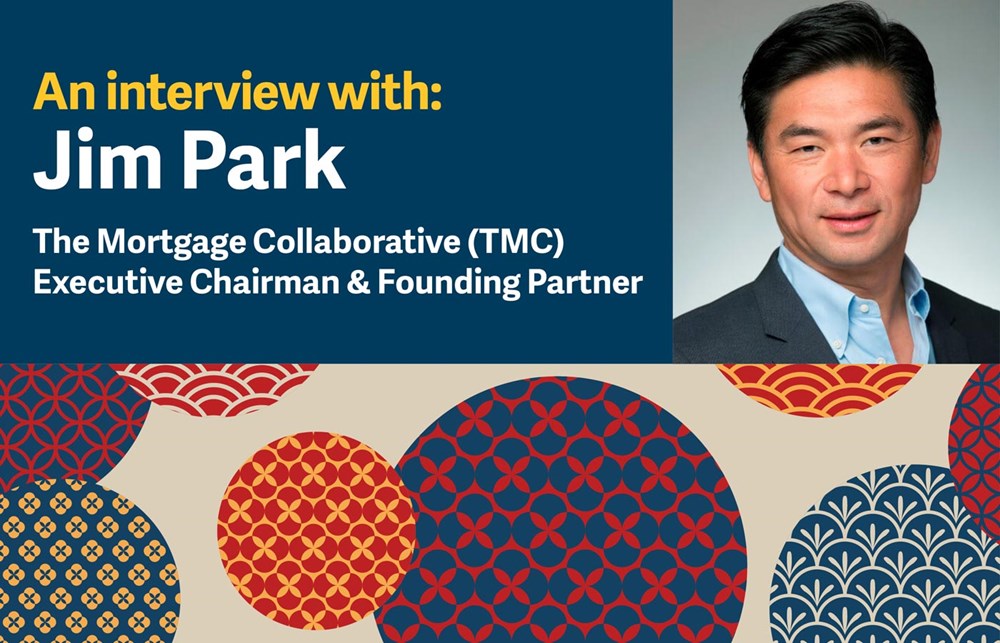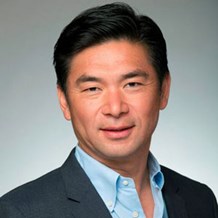In honor of Asian American Pacific Islander (AAPI) Heritage Month, we reached out to several prominent AAPI leaders in the housing and mortgage industry to celebrate their success, learn from their experience and gain insight into the challenges facing the mortgage industry. Today, we’re happy to share this interview with Jim Park (Executive Chairman & Founding Partner of The Mortgage Collaborative).
Jim discusses Asian American outreach and connection, why diversity in America isn’t going away anytime soon, and what defines the AAPI community.
Some of our readers may be unfamiliar with The Mortgage Collaborative (TMC). Can you give us a brief history of the company?
We started The Mortgage Collaborative 8 years ago to leverage the collective power of the lending community. Our goal was to build a supportive and open environment for sharing ideas and encouraging more collaboration in order to create greater efficiency and increased profitability for our members. We also believe that this sense of collaboration could extend to our preferred partners, like MGIC. When you see TMC in action, you’ll notice we function more like a family and less like an industry gathering where companies see each other as competitors.
You have experience in the private, government and nonprofit sectors. In your opinion, why do you think diversity and inclusion are important in any role of the workplace?
We have all seen the numbers. Diversity in America isn’t going to shrink, and the fabric of America is becoming more colorful. That’s why the housing community has to be ready to serve this dynamic market if we are to prosper overtime. And to finance these growing and changing demographics, we have to rethink how lending is done, to recruit more culturally attuned originators, and to creatively recalibrate creditworthiness in order to open more doors.
In the workplace, I believe diversity and inclusion can help organizations become stronger, more resilient and more profitable. We know that diversity of thought can make organizations more nimble and adaptive. In this ever-changing environment, that flexibility is key to success and longevity.
We’re celebrating Asian American Pacific Islander Heritage Month in May. What does this month mean to you?
I immigrated to America when I was 9 from Korea. I did not know a single word of conversational English when I arrived. Like most immigrant families at that time, my parents had limited employment options so they worked various “menial” jobs to make ends meet. Ultimately, they saved enough to open up a dry cleaning business. That business required long hours and very little time off, so our summer vacations were typically 2 to 3 days long. And to make matters worse, my parents’ business didn’t do so well.
Fortunately, my parents cobbled together enough money for a down payment from people they knew to purchase a home (through an informal borrowing practice within the Korean community called “Kye”), which ultimately allowed them to benefit from a strong house appreciation. That equity/wealth from our family home helped to cover my sister’s and my college tuition and helped to pay off the debt from my parents’ failing business.
I tell you all that because obtaining recognition of Asian American Pacific Islander Heritage Month wasn’t without struggles. A couple of members of Congress in 1977 tried to pass a resolution to celebrate the AAPI community’s contribution to America but it failed to obtain the necessary support. But with renewed determination the following year, the effort passed and designated the first 10 days of May as “Asian/Pacific American Heritage Week.” What started out as a week or 10 days became a whole month over time!
For me, overcoming those struggles, hard work, and taking care of one another is what defines the AAPI community and why I am so appreciative that I can celebrate our community’s contributions today.
For those looking to connect with other Asians in the mortgage industry, what are some organizations they should consider joining?
There are 2 specific organizations I truly love and have had the pleasure of being involved with from the beginning of their formation nearly 2 decades ago. National Coalition of Asian Pacific American Community Development (nationalcapacd.org) is a national nonprofit intermediary that works with local nonprofit organizations that provide housing, social and economic support to low-wealth AAPI communities. Some of its member organizations are deeply involved with housing counseling and homeownership support for economically disadvantaged individuals.
Asian Real Estate Association of America (areaa.org) is a national real estate organization focused on supporting homeownership opportunities for AAPI community and serving as a powerful voice for real estate professionals throughout the country. AREAA partners with lenders and real estate agents alike to educate consumers and housing professionals on ways to better serve the AAPI community.
If you’re interested in working with the AAPI community, whether for your CRA business or your conventional conforming business, these 2 organizations can help you achieve your business goals. I am more than happy to connect you to them and share ideas on how best to leverage them to serve more AAPI homeowners.
How does the Asian community differ from other customers? Can you provide any insights or offer suggestions to those looking to attract and work with this community?
AAPI community is not a monolith. Social and economic experiences between AAPI subpopulations differ greatly. On the one hand, AAPIs have the highest national household income, high credit scores and significant cash on hand — all of which bodes well for homeownership. However, those averages in the AAPI community hide the less-talked-about conditions facing some subpopulation groups dealing with significant poverty levels and linguistic isolation. I advise everyone to first understand the community you want to serve. If you are in Minneapolis, you might want to focus on the Hmong community. Or if you are in Northern Virginia, it might be the Vietnamese or Korean community. Talk to your local real estate professionals and build relationships with loan originators who are serving these communities. Building that trust is the most critical step, and it starts with building relationships with those professionals that are actively engaged within the community.
It’s very unfortunate to see so many acts of anti-Asian racism happening throughout our country. Is there anything you would like to say to fellow Asian individuals facing these unfortunate times?
Since the beginning of the pandemic last year, there have been nearly 3,000 cases of reported hate crimes (although many hate crimes aren’t reported) against Asian Americans in this country, from people being set on fire to having their faces slashed with box knives to defenseless elderly individuals being attacked and killed in their own neighborhoods. Those attacks are now being targeted at young Asian America children as well. It makes me angry to see these unending coverage of attacks, and I do wonder how the progress we’ve made to become a more tolerant nation could be reversed so quickly. For the AAPI community, there has been a long history of facing discrimination and feeling like a “perpetual foreigner” in their own land, but what we are seeing today is more brazen and vicious than anyone has witnessed in generations.
The silver lining, if there is one, is that there is an awakening within the AAPI community. For too long, we’ve been told to keep our heads down, work hard and don’t complain. That is changing for our community now. The AAPI community is no longer willing to keep our heads down when we are faced with racist taunting and physical aggression. The community is speaking up, demanding change and taking action against these heinous crimes.
Looking back to my youth, I wished I had the courage to speak up more when racial slurs were thrown my way. I was more interested in fitting in than confronting these verbal attacks. Over time, I (and maybe the AAPI community) got desensitized to these demeaning statements, and by not fighting back consistently, we ultimately contributed to normalizing these verbal assaults. I firmly believe those days are behind us and the path forward will be different. My hope is that everyone (Asian Americans or Americans of any background) will stand together against these hate crimes and any form of discrimination. Last year’s social justice movement, prompted by the killing of George Floyd and too many others to name, was a powerful reminder that people of all races and background could unite in support of racial equity and common decency. I hope that spirit will move us once again."
Mortgage Connects
Jim Park Q&A:Connecting with Asian Americans in the community and the mortgage industry


Jim Park, Executive Chairman & Founding Partner of The Mortgage Collaborative
As Executive Chairman & Founding Partner of The Mortgage Collaborative (TMC), Jim Park provides oversight of business initiatives and works closely with TMC’s Board of Directors to ensure that the company achieves its annual and long-term goals. Park also serves as CEO for the Association of Asian American Investment Managers (AAAIM), a non-profit organization promoting ethnic and gender diversity within the investment industry. Jim also serves as Board Member Emeritus with the Asian Real Estate Association of America (AREAA). He is currently the Chair of the Audit and Finance Committee for International Centre of Insect Physiology and Ecology (icipe.org) - one of the largest Africa-based research organization focus on insect, plant and animal health. With nearly 30 years in the housing and mortgage banking field, Park has held various positions in the corporate sector, started several businesses, worked in federal and local governments, and helped to launch a number of prominent nonprofit organizations. Over the years, Park has served on various corporate, government and nonprofit boards, including chairing the last Federal Reserve’s Consumer Advisory Board along with past Federal Reserve Chair Ben Bernanke.